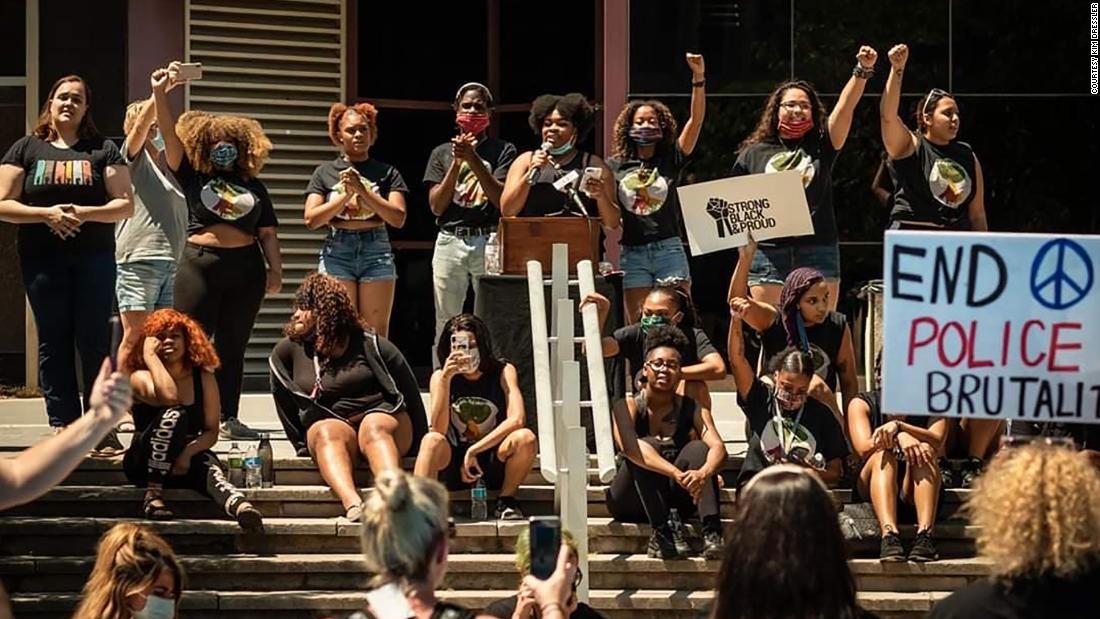[ad_1]
“It’s really amazing how many people are excited about this,” Chris Muckle, a founding member of the group, told CNN.
It was one example of how groups are reporting growing voter registration numbers amid protests over police brutality and racial injustice that have erupted across the nation, months out from the general election in November.
Last week, Rock the Vote saw more than 80,000 new voters register through its site, the most registrations the group has experienced in a single week of the 2020 election cycle, Carolyn DeWitt, president and executive director of Rock the Vote, told CNN.
The youth-focused voter registration group also had 2 million impressions on social media and 25,000 new followers on Instagram. Its June election graphic, listing the dates of this month’s presidential primaries, has been shared on Instagram more than 65,000 times.
“Protesting is one of the highest forms of civic participation,” Rock the Vote said in a statement last week. “As we fill the streets with our bodies and risk everything to be heard, let us also prepare to shock the system in November by filling ballot boxes with our votes.”
“From June 1 to June 8, Voto Latino registered 50,846 voters around the country online, with 42,940 of them from Texas. For comparison, from May 1 to May 8, Voto Latino registered 2,045 voters,” Danny Friedman, managing director at Voto Latino, told CNN.
Likewise, websites and apps for voter registration and information are seeing high levels of engagement.
On a typical election day, Vote.org expects to see high traffic on its site, which provides voting info and resources. Last Tuesday, when several states headed to the polls, was no exception. Vote.org’s engagement has remained high in the days since. A week out, Vote.org is seeing roughly five times the engagement it saw last Tuesday, said Andrea Hailey, CEO of vote.org. “While it’s only been a week, the sustained momentum is encouraging,” Hailey told CNN.
TurboVote, an online tool powered by Democracy Works that helps register voters and provides voting info, facilitates voter registration for apps like Snapchat, which actively seeks to register new voters when they turn 18. According to Rachel Racusen, director of communications at Snapchat, about 300,000 to 500,000 Snapchatters turn 18 each month.
Last week, TurboVote saw a spike in users arriving to its site from social media platforms that was roughly 11 times the average engagement from the eight weeks prior, Mike Ward, vice president of voter engagement at Democracy Works, told CNN.
In an effort to maintain momentum after this week’s protests, many youth-led groups are ramping up voter registration initiatives, including Warriors in the Garden in New York, Young Revolution in Illinois and Freedom March NYC, all groups born in the past week from the energy of the protests and founded to effect change in their own communities.
On Sunday, Mariah Cooley, the 18-year-old founder of Young Revolution, organized a march in honor of the lives lost to police violence in Peoria, Illinois. Following the march, Cooley, a student at Howard University, helped convene an open forum that included a question-and-answer session and voter registration. Cooley invited the NAACP to join, and it facilitated three voter-registration booths. With the help of the NAACP, Cooley was able to register about 150 voters, many of whom were between the ages of 18 and 24.
“It was very liberating to see the response when we told people we had registration booths,” Cooley told CNN. “In November we need to make our voices heard, and the biggest way we can is with the ballot. The fact that we got people my age to listen and be informed and register to vote was inspiring.”
Similarly, Freedom March NYC, a youth-led civil rights organization, is adding voter registration efforts to its protest and policy plans. Freedom March NYC is focused on dismantling the systems that have oppressed young black communities through nonviolent protesting, policy work and community empowerment. The group has helped organize a number of recent New York-based marches, including a nonviolent protest on May 31, the 99th anniversary of the Tulsa Race Massacre, during which a white mob attacked prominent black residents and businesses in Tulsa, Oklahoma, almost a century ago.
Chelsea Miller, 23-year-old co-founder of Freedom March NYC, stressed that in order to sustain this racial justice movement in the long term, the young and underrepresented voices of her community need to be amplified.
“Historically, the youth have not shown up to the polls in the way that we should,” Miller told CNN.
The majority of Freedom March NYC and Miller’s work in the past week was rooted in nonviolent demonstrations. At these protests, Miller raised her voice on issues of systemic violence and racism that she has witnessed firsthand.
But Miller explained that as much as she “stands on the podium” and “says it on the microphone,” real change needs to manifest in all areas of civic life.
“You can’t talk about systems without talking about voting,” Miller told CNN.
“Voting will not solve systemic racism,” Amer told CNN. “Voting will put into office reps who accurately represent what the country wants and needs, which is justice.”
[ad_2]
Source link


